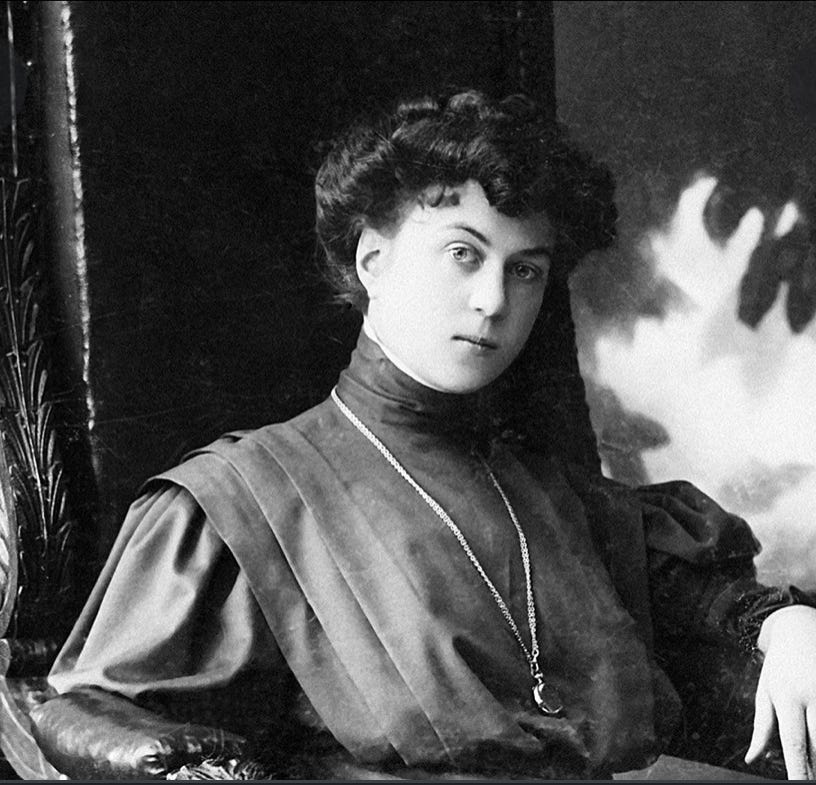The Truth About International Women's Day
Why it should be a worldwide day of mourning for the victims of communism and abortion
It’s March 8, 2022. You’ll be seeing lots of posts on social media about International Women’s Day. You might assume, as most people do, that this is a holiday which brings awareness to women’s issues and recognizes women’s contributions to the world. I hate to burst your bubble yet again, but the ideological underpinnings of International Women’s Day and its history are anything but innocent. There’s a chapter in my book, Occult Feminism: The Secret History of Women’s Liberation, where I explain how feminism is the original revolutionary spirit. It gives birth to all other revolutions. So it shouldn’t come as a surprise that Leon Trotsky credits International Women’s Day with sparking the Bolshevik Revolution.
In 1909, an American activist named Theresa Malkiel suggested the creation of a “National Woman’s Day” to the Socialist Party of America. Most suffragists and early feminist activists were Marxists and members of socialist organizations. The Socialist Party of America observed the first known National Woman’s Day on February 28th of that year in New York City. The following year, German Marxist feminists took inspiration from this and proposed creation of an annual “Women’s Day” at their International Socialist Women’s Conference. They saw it as a way to promote women’s suffrage and other feminist causes. In 1911, they marked the first International Women’s Day on March 19 which was observed by Marxists across Europe. On March 8, 1917 Russian women textile workers organized a demonstration on International Women’s Day which spread throughout the city of Petrograd. Leon Trotsky wrote of the event in his epic work “History of the Russian Revolution,” saying:
“23 February (8th March) was International Woman’s Day and meetings and actions were foreseen. But we did not imagine that this ‘Women’s Day’ would inaugurate the revolution. Revolutionary actions were foreseen but without date. But in morning, despite the orders to the contrary, textile workers left their work in several factories and sent delegates to ask for support of the strike… which led to mass strike... all went out into the streets.”
After the Bolsheviks took over Russia, Vladimir Lenin and one of his officials, Alexandra Kollontai, declared March 8th a holiday in the Soviet Union. Alexandra was the People’s Commissar for Welfare in Lenin’s administration. From a noble family of Ukrainian descent, Alexandra was a feminist radical who advocated for “free love” and women’s sexual liberation. She founded the Zhenotdel, the women’s department of the communist Bolshevik regime. The Zhenotdel was responsible for making Russia the first country in the world to legalize abortion in 1920. They even gave Russian women the right to free abortion in state hospitals.
Like most other prominent feminist figures, Alexandra divorced her first husband and abandoned her young son because she “felt trapped” and wanted to travel and join the Marxist revolutionaries. She expresses this in her own autobiography. She did not attempt to reconcile and have a relationship with her son until he was 20 years old. This is a pattern I have observed over and over in feminist radicals and activists. Alexandra had a string of affairs with multiple Marxist revolutionaries as she traveled the world. Often with men far younger than she, including her second husband who was 17 years her junior.
Later, she and Lenin parted ways. Lenin was not radical enough for Alexandra’s liking, and he threatened to have her executed for publicly criticizing him as not being committed enough to the Communist cause. Leon Trotsky wrote in his memoirs that was she was too far radically left and a hypocrite for waging war on Trotsky and Lenin, only to bow before Stalin. She was also criticized later in her life for remaining silent as Stalin executed many of her former lovers and friends.
Alexandra believed that the traditional family unit would dissolve as the second stage of communism was achieved. She is among the first Marxist feminists to popularize the idea of marriage and family as an oppressive relic of the patriarchy though her writings and speeches. She advocated for children to be wards of the state, raised communally, believing that children were detrimental to women’s liberation. She wrote:
"The worker-mother must learn not to differentiate between yours and mine; she must remember that there are only our children, the children of Russia's communist workers."
International Women’s Day was an integral part of the Russian Revolution and the many atrocities it committed in the 20th century. Whatever virtuous ideals you may want to attribute to this holiday now, it was a major milestone in the destruction of marriage and family. It ushered in the Communist regime that killed at least 20 million people. That doesn't include the number of babies killed by abortion in the last century. Alexandra Kollontai's policy of state- funded abortion has claimed the lives of hundreds of millions of babies in Russia alone. This set the precedent for legalizing abortion in other countries, leading to an estimated one billion abortions worldwide in the last century. The founder of International Women's Day is responsible for the greatest genocide in human history and declining birth rates around the world. For all women who value family and motherhood, this is not a day to be celebrated, but an international day of mourning.





Interesting article! I am familiar with Kollontai. Women's day is indeed of communist origins.